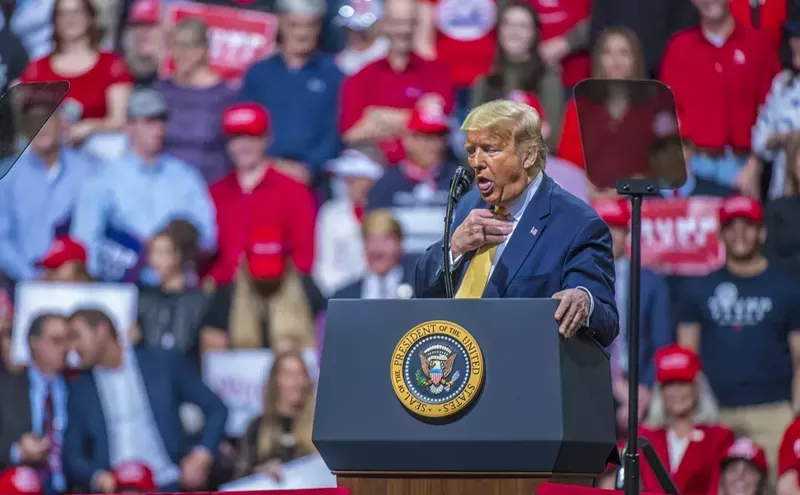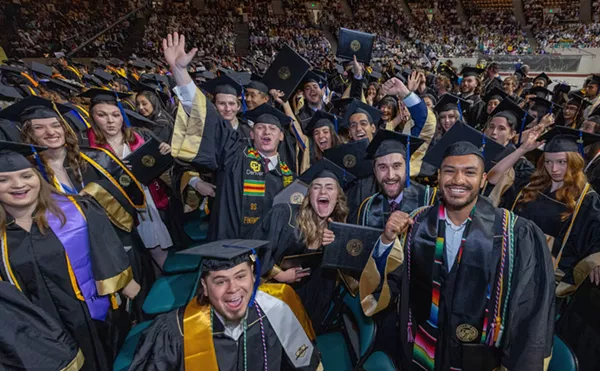Isn't it about time? With each election cycle, it seems to me that we always end up having to choose between a Douche Bag and a Turd Sandwich (yes, this is from a beloved South Park Episode). With launch of B-rad 4 Denver Mayor, our work will be focused on ending the ongoing 'Ground Hog Day-esque' game of voting for 'Change' and then getting nothing more than another political animal that appears to work only for the interests of the rich, powerful and politically connected.The declaration went on to itemize a roster of issues ranging from banning cars from the city center to "a friend indeed to Denver's medical and recreational marijuana" to "put a stop to hours-long wait to get a Voodoo Doughnuts" to "deliver a budget that eliminates stupid expenses and encourages thrift."
Yes, the announcement was a joke -- but a serious one.
See also: Denver Cruisers' Hilarious April Fools' Theme Schedule
"We're always serious about goofing about things that are important," explains Evans. This, after all, came from the man who'd read through the City of Denver's entire budget -- he found some questionable line items in the Wastewater section -- while recovering from knee surgery a year ago. This from the man who'd taken the Denver Cruiser Ride from thirteen friends and friends of friends who showed up for the initial gathering in 2005 to a weekly phenomenon that regularly attracts thousands of people -- 5,000 on the final ride of the fall, a turnout not much smaller than the number of registered voters in Denver between the ages of eighteen and forty who bothered to vote six weeks later in the November election.
And so even as Evans announced his joke campaign for mayor, he began considering launching a real one. "I spent the summer on the Cruiser Ride and people were saying, 'Hey, that would be cool,'" he recalls. "That's where we started talking about it." And when the rides ended for the season, he continued to talk about it with movers and shakers around town, some of them former supporters of Mayor Michael Hancock, some of them current Hancock supporters, and just about all of them agreeing on two things: A contested election is good for a city, because it encourages involvement and discussion -- and Evans doesn't have a shot in hell."Everyone says there's no chance, and why would you do something so crazy?" he says. "And I kind of like that."
He's certainly done crazy things before. Born and raised in Boulder, he got a BFA in painting and sculpture from the University of Arizona. After college, he hopped from city to city -- New York, San Francisco, L.A., Washington, D.C., even Kansas City. While working at Kinko's, he'd fax his résumé to the next city he was interested in seeing. "At my twentieth high-school reunion, I was the person who'd lived in the most places: twenty U.S. cities," he remembers.
But Colorado was home. He moved to Fort Collins in '93, then to Denver in '96. He worked at a great job in Boulder for three years, but the commute was crushing. Since then, he's stuck around Denver, doing work in graphic design and getting his real-estate license. And starting the Denver Cruisers.
That group has given him a real feel for an untapped constituency. "I see lots of young people here who want to engage," he says. "I see people from all over the planet coming to Denver, people who want to connect." To get them started, he posted an invitation to meet to discuss a potential candidacy on Facebook. A dozen people showed up last week, to talk about possible campaign proposals -- including raising the minimum wage and stopping the "I-70 ditch" proposal -- and hear some of Evans's strategy for actually winning. The pool of registered voters between the ages of eighteen and 44 in Denver is 143,495 (it would be almost twice as high if everyone registered); the total number of votes cast in the first round of the 2011 mayor's race was 114,895. Bottom line: "Is it possible to get 80,000 from this group to vote?"
And not just vote, but vote for Brad Evans.
"Am I the right person? I don't know," he says. "But why isn't anyone else stepping up?"
A couple people have stepped up: Chairman Seku, a frequent face at city meetings, and Marcus Giavanni, a write-in for governor last fall, are included alongside Hancock on the Denver Elections Divisions page of potential candidates. And a Denver Mayoral Election 2015 Wikipedia page lists three more "former or current candidates": Andy Juett, Ean Seeb and Kayvan Khalatbari. But last week Khalatbari, a cannabis consultant who's the founder of Sexy Pizza and Sexpot Comedy, declared that he's going for an at-large seat on Denver City Council, and any potential candidacies of the other two, both colleagues of Khalatbari, seem to have gone to pot.
But Evans is still considering it.
Continue for more on Brad Evans's possible mayoral race. Unlikely candidates have triumphed in the Denver mayor's race before -- and against popular incumbents, too. The field was particularly crowded back in 1983, when former district attorney Dale Tooley seemed like the most serious challenger to Mayor Bill McNichols. But there were other solid citizens running then, too, including Wellington Webb and a young former legislator named Federico Peña. He urged residents -- many of them transplants, like Peña and his advisors, who'd been lured to Colorado by nothing more than endless scenery and endless opportunities -- to "Imagine a Great City." (Full disclosure: My original partners at Westword came up with that slogan.) Denver voters not only imagined it, they helped make it happen: McNichols was booted in the first round and Peña won in the runoff. Today lauded as a true visionary, Peña had a bumpy first term that saw the bottom drop out of the city's economy when the oil boom went bust. He faced a serious challenge from Republican Don Bain in 1987, a challenge that again had voters imagining where they wanted the city to go. And he won.In 1991, Wellington Webb again ran for mayor, but even with his experience, he wasn't the favored candidate: Norm Early, who'd followed Tooley as DA, seemed to have the race in the bag -- and certainly had all the money. But Webb laced up his tennis shoes, walked the streets of Denver, and came from behind to win. He, too, faced a serious challenge as an incumbent; Denver City Councilwoman Mary DeGroot ran against him in 1995, and even took the top line in the first round. Webb ultimately beat her -- but the real winner was Denver, which benefited from months of impassioned discussion.
Twelve years ago, in January 2003, one of Denver's most unlikely candidates ever announced his own campaign for mayor. Brewpub owner John Hickenlooper, who was first encouraged to run when he led a fight to save the Mile High Stadium name, was polling at just 3 percent when he launched his campaign. Officially, at least; he'd been working behind the scenes for months, researching Denver issues and other cities' systems with a thoroughness that makes Evans's forays thus far seem like, well, like cruising. That background work, coupled with a quirky, upfront campaign that appealed to the next generation of imaginative voters, quickly pushed Hickenlooper to the top of another crowded field, and a win that few would have predicted just five months earlier.
The fact that underdogs can become top dogs in this city isn't lost on Evans -- or on others. Several potentially viable candidates have looked at running but decided it would be easier to wait for four years, discouraged by the prospect of taking on an incumbent with a $600,000 war chest. And powerful friends: Some people have warned Evans, who needs to work with the city to keep the Denver Cruisers rolling, that a run could endanger his creation. Then there's the fact that Hancock is genuinely likable; his favorable rating may not be as high as Hickenlooper's was in his heyday, but Hancock is still a popular mayor, even with Evans. "I don't have any issues with what he's done," he says. "I like Michael Hancock. I think he's good for the city. I think a public debate about how we make Denver better is what's important. Denver's in a place where it could be better."
Just having a competitive race could do that, he suggests: "I don't want to sound antagonistic. Denver has a great tradition of electing the dark horse." Even if the dark horse is a slightly goofy white guy whose phone case is a pair of brass knuckles and whose biggest claim to fame is getting 5,000 people to ride through the streets of Denver, often wearing wacky costumes. He's worn a few of his own; in fact, there are photos all over Facebook, and Evans knows you can't hide from your past. But he's also thinking about the future.
"If I do decide to run, there will be no mudslinging from me," he promises. Not that he has money to buy a slingshot with: Evans says he has about eleven bucks. "But I get marketing, I get social media, I know video companies," he says. "I don't need to buy TV."
And if he decides to run -- he may not make up his mind until February 3, the first day candidates can start collecting signatures on petitions -- Evans is going to go all out. No cruising this time. He'll start a listening tour, to hear what matters to the people in this city, to get them involved with politics again -- or maybe for the first time. "I want to put a face and a voice to what everybody thinks is not honest and truthful," he says. "People don't trust the system nationally -- is it possible to rebuild that trust? The spark of trying to get that potential bloc of voters to participate and what it could do in the bigger picture, I'm amped about," he admits. "And I'm equally terrified at the same time."
Not so terrified, though, that he hasn't thought about what he'll do if this underdog just happens to emerge as top dog: "Move into Cableland."
Send tips to [email protected].












